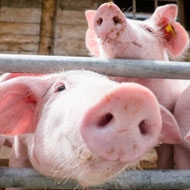Colistin use in animals to be reviewed

EMA says it will review its 2013 guidance, particularly relating to the use of colistin in pigs.
The European Medicines Agency (EMA) may change its advice on the use of colistin in animals. The move follows the recent discovery of a gene called MCR-1 that causes bacteria to become resistant to this 'last resort' antibiotic.
MCR-1 was first detected in bacteria isolated from pigs, pork and chicken products, as well as a small number of humans in China. Since then, it has also been found in the EU.
Colistin is one of the last defence antibiotics used for treating humans with infections caused by multi drug resistant bacteria.
In light of the findings, the European Commission has asked the EMA to update its advice on the responsible use of colistin in animals.
Due to the drug's importance as a last defence against antibiotic resistant infections in people, the agency says it will review its 2013 guidance, particularly relating to the use of colistin in pigs.
The current advice recommends maintaining the use of colistin in veterinary medicine, but only for treating infected animals and those in contact with them, not preventative use.
It also said the surveillance systems for antimicrobial resistance should be strengthened, and a new review carried out if a substantial increase in resistance was identified in animal bacteria.
EMA has reconvened its Antimicrobial Advice Ad Hoc Expert Group to assess all the available information and decide whether the 2013 advice should be amended. The agency says any update will take into account the drug's importance to both human and veterinary medicine, the impact of resistance and the availability of alternative treatments.



 The Veterinary Medicines Directorate (VMD) is inviting applications from veterinary students to attend a one-week extramural studies (EMS) placement in July 2026.
The Veterinary Medicines Directorate (VMD) is inviting applications from veterinary students to attend a one-week extramural studies (EMS) placement in July 2026.